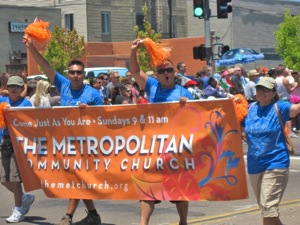
Author and activist Anne Lamott once said, “I do not understand the mystery of grace – only that it meets us where we are and does not leave us where it found us.”
I was so proud of the several faith communities who were proudly marching in Pride. Oh, if only those who have gone before us from previous generations could have joined us for Pride weekend. I can only imagine the range of their reactions to Pride Sunday. “What? A Sunday to celebrate being gay? What’s this world come to?”
And we’d get to explain that “pride,” in this context, is about undoing the centuries of shaming that society and the church have heaped on children of God, whose sexual orientation doesn’t coincide with the majority. In a way, it’s like in the Harry Potter books, where they undo a spell by saying it backwards. This is the kind of pride that cancels out layers and layers of shame that some grew up with.
We celebrate the victory in New York for same-sex marriage rights. We celebrate the slow dissolving of Don’t Ask, Don’t Tell. However, in Uganda, there’s currently legislation on the table that would make homosexuality a capital crime. It’s painful to think about how many people have died simply for being a member of a sexual minority, by ignorance and misguided legislation, or by bullying or shaming that resulted in suicide; and how many others lived in terror that someone would find out?
Why do we, as a church, march in the Pride parade? The Bible, a book that we love and read from every week, has been used both to justify the condemnation of Jews, women, scientists and LGBT people, among others, as well as to justify misguided prejudice and abuse. We must share the good news of God’s inclusive love for all.
We’ve all heard how the creation story of Adam and Eve has been used to teach God’s preference for heterosexuality as the only acceptable combination for interpersonal partnering. You’ve seen the T-shirt: “God made Adam and Eve, not Adam and Steve.”
And if all you do is focus on the punch line of this passage, it’s understandable how people can be persuaded by the rhetoric. But back up for a minute, and let’s take a closer look.
Biblical scholar Sherman Hesselgrave reminds us that the book of Genesis has not one, but two creation stories: the first that unfolds one day at a time, with God looking back on the six days of creation and finding it “very good;” and a second narrative that’s much more focused on relationships.
It says, “It is not good that the man should be alone; I will make him a helper as his partner. So out of the ground God formed every animal of the field and every bird of the air, and brought them to the man to see what he would call them …. The man gave names to all cattle, and to the birds of the air, and to every animal of the field; but for the man there was not found a helper as his partner.”
Hesselgrave points out that this is the language of biblical mythology – there were no CNN reporters on the scene, and written language was still far in the future, so what we have was passed down for generations by oral tradition. Nevertheless (Hesselgrave continues), “the narrative our ancestors told clearly indicates that God allowed the man to decide what a suitable companion would be; the Creator finally gets it right with Eve, and Adam approves. One person can read this passage and conclude that it therefore affirms that only a man and a woman can be suitable mates, while another can read the same passage and see how God partnered with the first (hu)man to create a companion that depended upon Adam’s approval.”
That opens up the story in a completely different way. A way that is growing in credibility as more and more people realize that sexual orientation is a gift, rather than a choice. More than that, it’s a gift wrapped in such unique mystery that no one can speak for someone else. Yet, the church for much of its history decided that it could do what God was not willing to do by dictating who can be one’s partner in life and who can’t be one’s partner in life.
I’d like to think that if Paul was writing the Letter to the Galatians today, it might have been updated to read: “There is no longer Jew or Greek, there is no longer slave or free, there is no longer male or female, or gay or straight; for all of you are one in Christ Jesus. And if you belong to Christ, then you are … heirs according to the promise.”
God’s self-disclosure, or revelation, has been progressive from the beginning. Jesus promises his disciples that God had yet more truth to reveal, truth they weren’t ready to hear at that time. Hesslegrave wrote, “There will always be those who are threatened by truth newly revealed beyond the biblical canon, whether the messenger is a Galileo, a Martin Luther or a Martin Luther King.”
Grace comes in many ways. Maybe in a word or a song. Or maybe a hug or a story or an action. Look for that gift of grace.
Rev. Dan Koeshall is the Senior Pastor at The Metropolitan Community Church (The Met) in San Diego, California, themetchurch.org.










